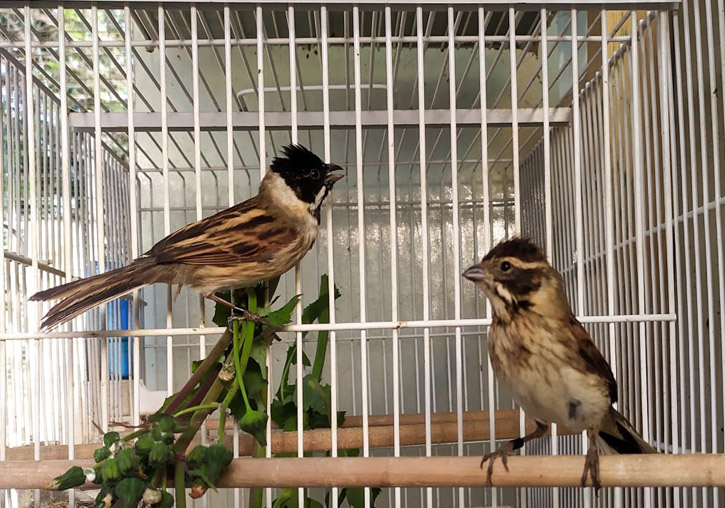The captive breeding of the Iberian-eastern reed bunting begins for its reintroduction in the Valencian Community
- Scientific Culture and Innovation Unit
- May 28th, 2021

The Cavanilles Institute of Biodiversity and Evolutionary Biology (ICBIBE) of the University of Valencia has initiated the first program at the state level for captive breeding of the Iberian-eastern reed bunting, an endangered species. The action, based on genetically compatible wild populations from S’Albufera Natural Park of Mallorca, has the support of the Biodiversity Foundation of the Ministry for the Ecological Transition and the Demographic Challenge, the Valencian Government and the Government of the Balearic Islands.
One of the lines of action contemplated by the “ex situ” conservation project of the Iberian-eastern reed bunting (Emberiza schoeniclus witherbyi) is the creation and implementation of the first captive breeding program at the state level to obtain captive-born individuals with which to reinforce the population. and the reintroduction in different wetlands of the Natura 2000 Network, in the most optimal ones of the Valencian Community.
Since the results of the last national census of the reed bunting carried out by the Spanish Ornithological Society in 2015, the S’Albufera Natural Park of Mallorca has become the second wetland with the highest presence of pairs of the Iberian-eastern subspecies in the entire Spanish territory. Four young individuals, two females and two males, were successfully captured and transported there.
Named Prax, Lola, Iván and Ana, “they are successfully adapted to the new breeding facilities”, explains Juan S. Monrós, professor in the Department of Ecology and researcher at the Cavanilles Institute of Biodiversity and Evolutionary Biology of the University of Valencia. “In this place they will spend the nesting season in order for nature to follow its course and allow us to achieve a new generation of Iberian-eastern reed bunting in perfect conditions to be reintroduced into their natural habitats and, thus, reinforce the diminished population size of this subspecies in the wetlands of the Valencian Community”, continues the person in charge of the project.
The “ex situ” conservation project of the Iberian-eastern reed bunting began at the end of 2020 with the coordination and collaboration between the Ministry of Agriculture, Rural Development, Climate Emergency and Ecological Transition of the Valencian Government and the Ministry of Environment and Territory of the Government of the Balearic Islands.
The research team is made up of seven scientists and managers who specialise in the conservation of this species, in captive breeding or in communicating project information to the public. Three belong to the ICBIBE of the University of Valencia and one to the Polytechnic University of Valencia. Juan S. Monrós, main researcher of the project, has worked since 2006 in the conservation of the Iberian-eastern reed bunting. Two others are wildlife managers, specialised in captive breeding of wild bird species and María Antón is the manager of social networks for this project and an audiovisual communication and dissemination technique.
More information:
“Ex situ” conservation project of the Iberian-eastern reed bunting.
















